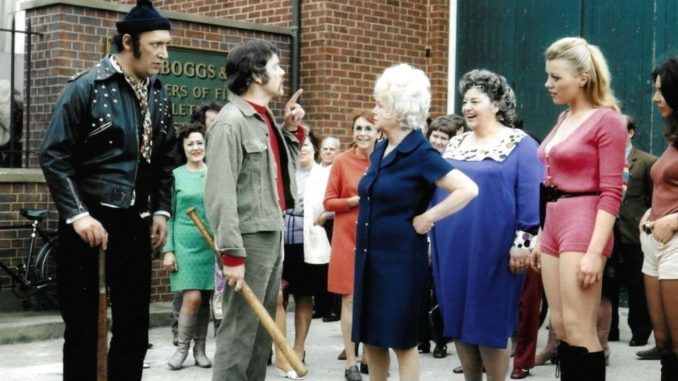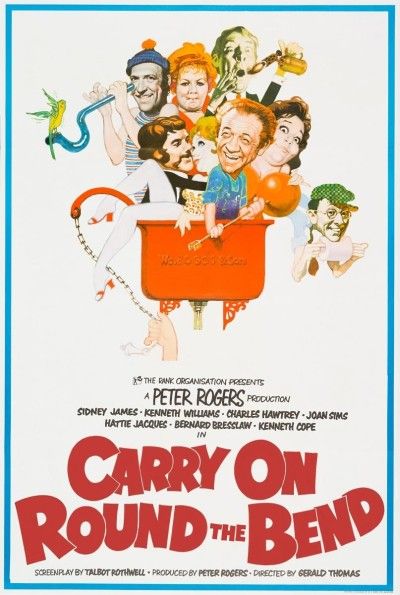
Rating: C
Dir: Gerald Thomas
Star: Kenneth Cope, Sidney James, Kenneth Williams, Jackie Plummer
a.k.a. Carry On Round the Bend
Somewhat notoriously, this is reportedly the first in the franchise to bomb on release – it took five years to recover its budget, due to overseas sales, etc. The generally accepted reason is the film making fun of trade unions, and thereby alienating the British working class who were the series’s core audience. I’m a bit sceptical of this. Working class humour in the seventies was pretty robust: the satire here is hardly cruel or harsh, and is very specific in nature. The target is Vic Spanner (Cope), the shop steward at the ceramics factory owned by W.C. Boggs (Williams), who will call the workers out on strike at the drop of a tea-break. Or if the local football team is playing at home.
In between the bouts of industrial action, the plotting here is back to being loose. A contract to deliver bidets to the Middle East. A love-triangle between Spanner, Boggs’s son Lewis (Richard O’Callaghan, as bland as ever) and tea-girl Myrtle (Plummer), the daughter of factory foreman Sid Plummer (James). A company outing to Brighton. The budgie belonging to Sid’s wife (Hattie Jacques) predicting horse-races. It never particularly gels into anything much, and that may explain its lacklustre performance, as much as any trade union sympathies. Though that the title was originally going to be Carry On Comrade might suggest where the makers’ sympathies lie, in the struggles which tore apart Britain in the early seventies.
 Given the name and the situation, I was expecting there to be considerably more toilet humour. This certainly exists – it could hardly be otherwise, in a time where, apparently, you couldn’t even describe a bidet’s function. It is perhaps the only movie in history to have a credit to “Royal Doulton Sanitary Potteries”, though according to the IMDb, Twyfords actually provided the ceramic items for the film. But the script gets much of that out of its system (or cistern?) early, and thereafter concentrates on the other elements, outlined above. The problem is, much of it isn’t particularly amusing, though I did like the cinema visit to see The Secret Glory of Love, a film rejected by the BBFC, but approved by the local council.
Given the name and the situation, I was expecting there to be considerably more toilet humour. This certainly exists – it could hardly be otherwise, in a time where, apparently, you couldn’t even describe a bidet’s function. It is perhaps the only movie in history to have a credit to “Royal Doulton Sanitary Potteries”, though according to the IMDb, Twyfords actually provided the ceramic items for the film. But the script gets much of that out of its system (or cistern?) early, and thereafter concentrates on the other elements, outlined above. The problem is, much of it isn’t particularly amusing, though I did like the cinema visit to see The Secret Glory of Love, a film rejected by the BBFC, but approved by the local council.
Otherwise, while some lines are certainly funny, and the performances are solid enough, the only extended sequence I enjoyed was the return journey from Brighton. It becomes a Benny Hill-like sequence of sped-up pub visits and toilet breaks, accompanied by an equally frenetic medley of rapid-fire songs by regular composer Eric Rogers. The initial cut is supposed to have run fifty minutes over, leading to the removal of Terry Scott’s entire role as a union boss. I wonder if the editing necessary as a result, might be part of the problem. As is, threads like Sid’s psychic budgie, or his distinctly non-humourous unrequited relationship with co-worker Chloë Moore (Joan Sims), come off as unfinished ideas rather than coherent elements.
